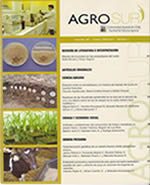Waterlogging and its effect on the physiology, growth and yield of wheat in Mediterranean zones managed under no tillage
Main Article Content
Abstract
In the last years the use of no tillage has increased due to several benefits compared to conventional tillage, such as the reduction in farm fossil fuel use, decrease in soil erosion, and the enhancing of soil structure. However, it has been observed that crops on soils that have medium to fine textures and are managed under this system, show a decline in theirs yields in rainy years, compared with conventional tillage. The aim of this work was to collect the necessary information to analyze if the wheat yield decrease in the context of Mediterranean environments is associated with a waterlogging event, noting its main causes and effects on the crop. For this purpose, a review of scientific journals and books related to soil science, plant physiology and agronomy was carried out. According to the information gathered, no tillage in soils with medium to fine textures is linked with a surface compaction, a factor that negatively affects the soil hydrology, suggesting the possibility of waterlogging events during rainy seasons. This condition alters the soil oxygen diffusion, causing a reduction in its concentration and the increase of potentially toxic compounds for wheat. In the plant, waterlogging induces an energy crisis, diminishing the gas exchange and water and nutrients uptake, which leads to restricted growth and yield of the crop.

